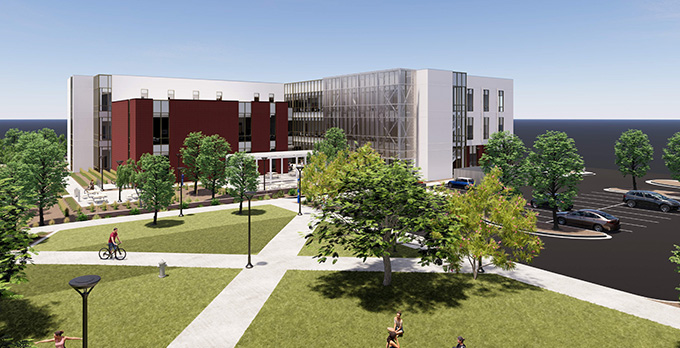There are big changes afoot, as The University of New Mexico’s College of Population Health (COPH) prepares to transition into an accredited school of public health. The process is a lengthy one, so the target is to stand up the School of Public Health by 2026.
There’s already visible growth toward that goal, in the form of new, long-needed facilities. Construction started almost a year ago, in August of 2022, when The University of New Mexico Health Sciences turned the first shovel of New Mexico soil for the building that will house the new College of Nursing and Public Health Excellence (CON-PHE). The new building will enable both the Colleges of Nursing and that of Population Health to bring more faculty together; more space is needed to accommodate all faculty from both colleges and continued growth. The 93,740-square-foot building is going up on Tucker Avenue, near the Domenici Center for Health Sciences Education. A three-story building, the edifice will be home to classroom spaces, offices for faculty and staff of both colleges, as well as community hubs.
As a first step toward the goal of accreditation by the Council on Education for Public Health (CEPH), the COPH has begun a cooperative PhD program with New Mexico State University in Health Equity Sciences. Accreditation by CEPH is a process that includes multi-level review to establish that the program meets national standards created by public health professionals, including both academics and practitioners.
UNM established its successful Master of Public Health degree program way back in 1994. At the time, it was housed within the UNM School of Medicine (SOM). The creation of that degree program led to developing the Bachelor of Science in Population Health, along with the opening of the College of Population Health (COPH) in 2016, though it lacked a home of its own, sharing space with the UNM Family Practice Clinic with many classes being held at the Domenici Center.
Tracie C. Collins, MD, MPH, MHCDS, who is Dean of the College of Population Health, has set the college’s sights on the next level, transforming the CoPH into a School of Public Health. Which raises a couple of very good questions: if the university offers both masters and PhD’s in public health, why start an entire school, given the rigorous work that requires? The answer, according to the College, is providing more resources for students and the reputation of the school including the regard in which it’s held.
Collins summed it up nicely, saying, “Becoming a School of Public Health will allow us to build upon the important work we and others have been doing with communities to secure health and wellness for all New Mexicans.”
“CEPH accreditation,” Collins explained, “assures students that their degree program has completed a multi-level review based on nationally recognized standards developed by leading public health academics and practitioners.”
There’s also a level of prestige and confidence that an accredited program possesses. “CEPH accreditation,” Collins explained, “assures students that their degree program has completed a multi-level review based on nationally recognized standards developed by leading public health academics and practitioners.” This gives it stronger appeal to students considering UNM’s public health offerings versus those of other universities. Accreditation will also, according to the COPH, give prospective employers of UNM public health grads the confidence “that the graduates they hire from UNM will have the essential skills and knowledge that are required for today’s public health field.”
Perhaps most importantly, it helps strengthen UNM’s commitment to serve all New Mexicans. “A School of Public Health in New Mexico can be a leader in the country for addressing the needs of rural, urban, Tribal, and other diverse communities to achieve positive health outcomes,” said Collins.
Apart from the impressive new facility, much work remains, as the CEPH accreditation process is a heavy lift, taking roughly two years to complete. The two major parts of the process include the submission of the application, which itself is an involved process for both the COPH preparing the application and CEPH reviewing it. After that, there’s another year of review, with CEPH conducting on-site audits and evaluations.
In addition to the rigorous accreditation process, COPH has added 30 staff and faculty, a process that has been greatly aided by a 2022 legislative state appropriation, which will also help the college in other efforts as it stands up another jewel in UNM’s academic crown.

